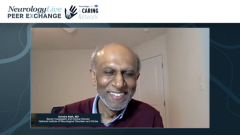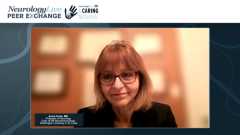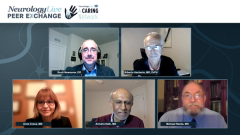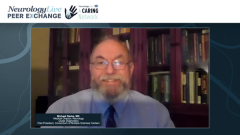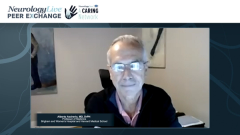
Future Directions in Research and Treatment
Looking to the future of multiple sclerosis care, the panel of thought leaders pose important questions that remain to be answered in the research and treatment of multiple sclerosis.
Episodes in this series

Scott Newsome, DO: Anne, to wrap things up, do you have any words of wisdom? Or do you want to put Alberto on the spot and have him wrap things up?
Anne Cross, MD: I’ll definitely put Alberto on the spot. We have him here as our guest, and I’d like to know more about what he thinks might be treatments in our lifetime. Or do we have to get rid of the virus in babies and do a long experiment, when we’ll all be dead at the end?
Scott Newsome, DO: Don’t be so pessimistic.
Alberto Ascherio, MD, DrPH: I don’t know, but I wouldn’t give up trying. I agree with the skepticism. I agree with you, Avi, but we still have to try. If we can, we should try, because the possibility that we can get a better treatment if not a cure targeting the virus may sound remote, but it’s possible. I wouldn’t want to give that up as a priority.
Avindra Nath, MD: That’s true. I agree.
Michael Racke, MD: Avi, I’m going to play devil’s advocate. If we look at other viral illnesses that cause demyelinating disease, and in mice—Theiler [murine encephalomyelitis] virus, coronavirus, or mouse hepatitis virus—how does that compare with the findings for EBV [Epstein-Barr virus] and MS [multiple sclerosis]?
Scott Newsome, DO: That question is for you, Avi.
Avindra Nath, MD: Oh, for me?
Michael Racke, MD: You’re the virologist here, buddy.
Scott Newsome, DO: I’m not answering that. I have no idea.
Avindra Nath, MD: I don’t know those models that well, but you need a persistent viral infection. It’s true that a lot of it is immune mediated. With the Theiler virus, you get this slowly progressive chronic neurodegeneration and there’s virus in the CNS [central nervous system].
Michael Racke, MD: That’s clearly a big difference.
Avindra Nath, MD: Yes. There’s virus in the CNS.
Anne Cross, MD: Although, Stephen Miller showed that you can get epitope spreading there too, and some antimyelin.
Michael Racke, MD: That could still be a genetic background phenomenon in why it’s progressive as opposed to getting attacked.
Scott Newsome, DO: When you guys figure it out and have a treatment, tell me in which patient the treatment can be used. Then I’ll be happy to prescribe it as long as it’s safe.
Avindra Nath, MD: If only it were that simple.
Michael Racke, MD: Avi, are there other animal models that people have used? I don’t know of any examples of a demyelinating disease in mice where people are trying to make a model for EAE [experimental autoimmune encephalomyelitis] where the virus isn’t there.
Avindra Nath, MD: Yes, the virus has to be there. HHV-6 [human herpesvirus 6] is the same thing that Steve did in marmosets. You have to put the virus in there in order to cause the demyelination.
Alberto Ascherio, MD, DrPH: The virus may be very difficult to find in the brain. For example, diminutive RNA hepatitis virus isn’t easy to find in the brain.
Avindra Nath, MD: Yes. There’s a massive immune attack. There’s the canine distemper virus story; there’s another 1. There’s a lot of stuff that people had done in the past with these viruses.
Alberto Ascherio, MD, DrPH: I have a question for the immunologist. If the main mechanism is in you, why is it so difficult to find the antigen? I’ve looked at this literature, but I can’t find the answers. It’s been 30 or more years of trying to find it, and it’s not being found.
Michael Racke, MD: It depends on you what you believe. People have been able to demonstrate in multiple sclerosis that people have memory T cells to myelin antigens. That doesn’t necessarily mean that’s causing disease. It could be an epiphenomena, epitope spreading after some virus started it. The other thing that’s interesting is the way these interact the same with vitamin D. Including yours, there are plenty of papers that suggest that if you get Epstein-Barr virus and had low vitamin D, that enhances it even more. What did the vitamin D do in this picture? It would be interesting. You weren’t able to look at vitamin D levels in the same samples, were you?
Alberto Ascherio, MD, DrPH: Yes. Vitamin D deficiency will roughly double the risk of the MS. If you have the optimal level compared with the lowest level, there’s a 2-fold variation of risk.
Scott Newsome, DO: I think Mike was saying in the recent study.
Michael Racke, MD: Right, in the same study.
Alberto Ascherio, MD, DrPH: In the same population, but not in this paper and not in the EBV negative, we’re going to do that.
Michael Racke, MD: But the point is if you were EBV negative with low vitamin D, you still don’t get MS.
Alberto Ascherio, MD, DrPH: Right.
Michael Racke, MD: You have to be EBV positive. But if you’re EBV positive with low vitamin D, you’re much more likely to get MS.
Alberto Ascherio, MD, DrPH: It’s 2-fold higher compared with people with good vitamin D levels.
Scott Newsome, DO: Alberto, you’ve made me a believer, and that’s hard to do. I’m a skeptic at heart. That’s fantastic work, and a lot of years in the making. I learned a lot during this panel session. I want to give a shoutout to Alberto, who’s going to be presenting within the Whitaker Lecture at this year’s CMSC [Consortium of Multiple Sclerosis Centers Annual Meeting], which I’m excited about. For those of you who are listening, please attend the CMSC. It’s going to be in National Harbor, Maryland, right outside Washington, DC.
We’ve had a rich discussion. I thank all the panelists, friends and colleagues for beautifully going back and forth about EBV and the implications at the bench side and the bedside. On behalf of our panelists, I want to thank all of you for watching this special Neurology Live® Peer Exchange.
Transcript Edited for Clarity
Newsletter
Keep your finger on the pulse of neurology—subscribe to NeurologyLive for expert interviews, new data, and breakthrough treatment updates.

